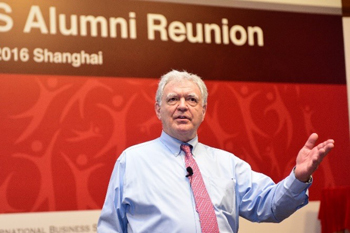Leadership Lessons from Hostage Crises

George Kohlrieser’s hostage rescue stories will make you sweat, but you will be impressed by the composure this psychology expert showed in those situations. As a famous hostage negotiation expert, and Professor of Leadership and Organisational Behaviour at IMD business school, Kohlrieser understands the similarities between hostage negotiation and leadership.
He headlined a recent CEIBS alumni reunion where he explained his Secure Base Leadership theory and introduced his award-winning book Care to Dare: Unleashing Astonishing Potential through Secure Base Leadership. Read on for more in this Q&A:
Q: From your experience, how can you construct effective communication while building-up a Secure Base?
George Kohlrieser: First, you have to stay curious about the environment around you. Just imagine dealing with a hostage crisis: you have to figure out why the hijacker is doing this, and what he wants. You have to show the hijacker your interest in him, that you see him as a human being. Your eye contact and body language are the fundamental ways by which you communicate with him.
This is the same with business leaders. You cannot focus only on your responsibilities, otherwise you lose the opportunity to communicate with and inspire others. This largely explains why so many leaders fail. A lot of leaders get annoyed easily and then lose self-control. This is what we call “Amygdala Hijack”. Under this condition, the more they do, the more mistakes they make; and the situation actually gets worse. Hence, hostage negotiations can provide very good lessons for one studying Leadership.
Q: How can a leader simultaneously take care of subordinates and encourage them to embrace challenges?
Kohlrieser: This is an important question: as a leader, how much care will you show to your staff? Many would say that leaders should show 100% care, but also need 100% authority. Well, this is exactly what we call the “Paradox of Caring”. We shouldn’t confuse “helping” with “caring”. When a crisis happens, there is a way to care for your employees and also win their respect. Leaders should provide employees with an authentic feeling of protection. To do this, leaders should first become a secure base for themselves.
Male and female leaders are different. A recent article argues that female leaders who have kids will pay more attention to sustainable leadership. Females are actually better leaders than males by nature, because they inherently have greater skills to build relationships, and to show stronger empathy. Having said that, females need to develop negotiation skills, so they know how to fight back, and to defend their position – this is exactly what male leaders are good at.
Q: How can Secure Base Leadership influence a company’s development strategies?
Kohlrieser: You go to Starbucks not only for their coffee but also the experience. Actually, Starbucks’ marketing strategy is experience marketing. Also, every automobile manufacturer sells not only their cars, but also the added values. Similarly, not only customers need experience, our employees need experience, too. If employees think that they are only machines, then they will feel their contribution is meaningless, which will affect the quality of their products and services.
Research data show that, in Germany, only 12% of employees feel that they actively participate in running their companies. In France, this number is only 7%; China, 28%. Why is this? Well, because the West has already passed the developing phase that China is now experiencing. Chinese workers have more opportunities, and they want to earn money, so they are motivated; but Western workers expect more from their jobs.
As leaders, we need to help employees learn and discover their own interests. If leaders cannot make change, problems will ensue. We always think that people hate change. But this is wrong: what people hate is not change, but the pain changes bring. What does the culture of a company look like? Just observe what employees do when their boss is not there.
Q: Chinese society and culture is very different from the West. Does your theory work in China?
Kohlrieser: When talking about leadership and management, Chinese people have a big advantage, which is the family bond. Chinese people are good at building personal relationships. They are different from people living in Western and Northern Europe, who have very weak family bonds. Having said that, European people have their own advantages, and Chinese people can learn from them.
Another advantage of Chinese people is their awareness of “saving face”. Chinese people know how to understand others; saving others’ faces is to show others respect. But, because of this, Chinese employees are often mute when facing the authority.
Chinese people need to learn to show their courage. On the other hand, Chinese leaders must remember that domineering leadership styles will threaten the health of a leadership structure. Therefore, Secure Base leadership also applies to China. But Chinese people first need to change their way of thinking, so they can see this world in a different way.
Q: Is being a Secure Base Leader enough to bring success? If not, what should we do next?
Kohlrieser: This is a continuous journey, a life-long journey. Everyone needs to know what he or she wants. Go find yourself a new dream or goal, and keep improving. Stay open to opportunities, never stop communicating and building relationships, and be ready for both success and failures.
For more information about CEIBS Global EMBA programme please visit here.













